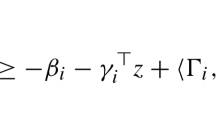Abstract
We study the robust assignment problem where the goal is to assign items of various types to containers without exceeding container capacity. We seek an assignment that uses the fewest number of containers and is robust, that is, if any item of type \(t_i\) becomes corrupt causing the containers with type \(t_i\) to become unstable, every other item type \(t_j \ne t_i\) is still assigned to a stable container. We begin by presenting an optimal polynomial-time algorithm that finds a robust assignment using the minimum number of containers for the case when the containers have infinite capacity. Then we consider the case where all containers have some fixed capacity and give an optimal polynomial-time algorithm for the special case where each type of item has the same size. When the sizes of the item types are nonuniform, we provide a polynomial-time 2-approximation for the problem. We also prove that the approximation ratio of our algorithm is no lower than 1.813. We conclude with an experimental evaluation of our algorithm.







Similar content being viewed by others
Notes
Note that \(S_i \subseteq S_j\) is the condition for the general case; for the case where \(k_i=k_j\) for all \(i,j \in \{1,2,\ldots ,n\}\), the condition is \(S_i=S_j\).
References
Chekuri C, Khanna S (2000) A PTAS for the multiple knapsack problem. In: Symposium on discrete algorithms (SODA)
Epstein L, Levin A (2006) On bin packing with conflicts. In: Proceedings of the workshop on approximation and online algorithms (WAOA)
Fleischer L, Goemans MX, Mirrokni VS, Sviridenko M (2006) Tight approximation algorithms for maximum general assignment problems. In: Proceedings of the symposium on discrete algorithms
Garey MR, Johnson DS (1979) Computers and intractability: a guide to the theory of NP-completeness. Freeman, New York
Jansen K (1999) An approximation scheme for bin packing with conflicts. J Comb Optim 3(4):363–377
Jansen K, Öhring S (1997) Approximation algorithms for time constrained scheduling. Inf Comput 132(2):85–108
Korupolu M, Rajaraman R (2016) Robust and probabilistic failure-aware placement. In: Proceedings of the symposium on parallelism in algorithms and architectures (SPAA), pp 213–224
Korupolu M, Meyerson A, Rajaraman R, Tagiku B (2015) Robust and probabilistic failure-aware placement. Math Program 154(1–2):493–514
Mills K, Chandrasekaran R, Mittal N (2017) Algorithms for optimal replica placement under correlated failure in hierarchical failure domains. In: Theoretical computer science (pre-print)
Rahman R, Barker K, Alhajj R (2008) Replica placement strategies in data grid. J Grid Comput 6(1):103–123
Shmoys D, Tardos E (1993) An approximation algorithm for the generalized assignment problem. Math Program 62(3):461–474
Sperner E (1928) Ein Satz über Untermengen einer endlichen Menge. Math Z 27(1):544–548
Stein C, Zhong M (2018) Scheduling when you don’t know the number of machines. In: Proceedings of the symposium on discrete algorithms (SODA)
Stirling J (1730) Methodus differentialis, sive tractatus de summation et interpolation serierum infinitarium. London
Urgaonkar B, Rosenberg A, Shenoy P (2007) Application placement on a cluster of servers. Int J Found Comput Sci 18(5):1023–1041
Acknowledgements
The authors would like to thank Samuel Barnes and Nate Devine for their helpful corrections on an earlier version of this work.
Author information
Authors and Affiliations
Corresponding author
Additional information
Publisher's Note
Springer Nature remains neutral with regard to jurisdictional claims in published maps and institutional affiliations.
Rights and permissions
About this article
Cite this article
Christman, A., Chung, C., Jaczko, N. et al. Robustly assigning unstable items. J Comb Optim 44, 1556–1577 (2022). https://doi.org/10.1007/s10878-019-00515-w
Published:
Issue Date:
DOI: https://doi.org/10.1007/s10878-019-00515-w




